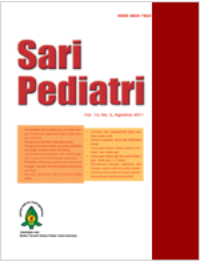Hubungan Pengetahuan, Sikap, dan Dukungan Unit Kerja/Departemen dengan Pemberian Air Susu Ibu Eksklusif pada Tenaga Kesehatan Rumah Sakit Hasan Sadikin
Sari
Latar belakang. Faktor yang memengaruhi pemberian ASI eksklusif pada ibu bekerja adalah pengetahuan, sikap, dan dukungan institusi. Petugas kesehatan berperan ganda, yaitu sebagai ibu bekerja dan panutan praktek pemberian ASI.
Tujuan. Memperoleh hubungan antara pengetahuan, sikap, dukungan unit kerja terhadap praktek pemberian ASI eksklusif oleh tenaga kesehatan di Rumah Sakit Umum Dr. Hasan Sadikin (RSHS).
Metode. Penelitian cross-sectional dengan metode consecutive sampling, dilakukan pada bulan Januari-Maret 2016 pada peserta program pendidikan dokter spesialis (PPDS), peserta program pendidikan profesi dokter (PSPD), perawat, dan bidan wanita; berusia ≤37 tahun; bekerja atau belajar di RSHS; memiliki anak lahir tunggal berusia 6−24 bulan; mengisi kuesioner dan dianalisis dengan multivariat
Hasil. Pengetahuan (OR IK95%=3,7; p=0,013) dan dukungan tenaga kesehatan (OR IK95%=3,45; p=0,031) berhubungan dengan praktek pemberian ASI eksklusif.
Kesimpulan. Pengetahuan ibu berhubungan dengan praktek pemberian ASI eksklusif, sementara dukungan unit kerja/departemen dan sikap tidak berhubungan dengan hal itu. Dukungan petugas kesehatan merupakan faktor perancu yang berhubungan dengan hal tersebut.
Kata Kunci
Teks Lengkap:
PDFReferensi
United Nations for Children’s fund. Breastfeeding. Diunduh 26 Agustus 2015. Didapat dari: http://www.unicef.org/nutrition/index_ 24824.html.
Kementerian Kesehatan Republik Indonesia. Riset kesehatan dasar (Riskesdas) 2013 Diunduh 26 Mei 2015. Didapat dari: http:// www.depkes.go.id/ resources/ download/general/ Hasil%20Riskesdas% 202013.pdf.
Kementerian Kesehatan Republik Indonesia. Profil kesehatan Jawa Barat tahun 2012 Diunduh 15 Agustus 2015. Didapat dari: http:// www. depkes. go.id/ resources/download/profil/PROFIL_KES_PROVINSI_2012/ 12_Pofil_Kes. Prov. JawaBarat_2012. pdf.
Horta BL, Victoria CG. Short term effect of breastfeeding: a systematic review. 2011. Diunduh 4 September 20015. Didapat dari: http://apps.who.int/iris/bitstream/10665/95585/1/9789241506120_eng.pdf.
Lamberti LM, Zakarija-Grković I, Walker CLF, Theodoratou E, Nair H, Campbell H, dkk. Breastfeeding for reducing the risk of pneumonia morbidity and mortality in children under two: a systematic literature review and meta-analysis. BMC Public Health 2013: 13:S18.
Edmond KM, Zandoh C, Quigley AM, Amenga-Etego S, Owusu-Agyei S, Kirkwood BR. Delayed breastfeeding initiation increases risk of neonatal mortality. Pediatrics 2006;117:e380-6.
Jones G, Stekee RW, Black RE, Bhutta ZA, Morris SS, Bellagio Child Survival Study. Child survival II. How many deads can we prevent this year? Lancet 2003;362:65-71
Roig AO, MartÃnez MR, GarcÃa JC, Hoyos SP, Navidad GL, Ãlvarez JCF. Factors associated to breastfeeding cessation before 6 months. Rev Latino-Am Enfermagem 2010;18:373-80.
Obilade TT. The knowledge, attitude and practice of exclusive breastfeeding among mothers in two semiurban areas around a Baby Friendly Hospital Initiative (BFHI) designated hospital in Lagos State, Nigeria. Int Arch Med 2015:15:1-13
Haroon S, Das JK, Salam RA, Imdad A, Bhutta ZA. Breastfeeding promotion interventions and breastfeeding practices: a systematic review. BMC Public Health 2013;13:S3-20.
Abdullah GI, Ayubi D. Determinan perilaku pemberian air susu ibu eksklusif pada ibu pekerja. KesMas 2013;7:299-303
Johnston ML, Esposito N. Barriers and facilitators for breastfeeding amomg working women in the united states. J Obstet Gynacol Neonatal Nurs. 2007:36:9-20.
Ahluwalia IB , Morrow B, Hsia J. Why do women stop breastfeeding? findings from the pregnancy risk assessment and monitoring system. Pediatrics 2005;116:1408-12.
Mari H. Breasfeeding: factor associated with the continuation of breastfeeding, the current situation in Japan and recommendation for further research. J Med Invest 2007;54:224-34.
Notoatmodjo S, penyunting. Konsep perilaku dan perilaku kesehatan Edisi ke−1. Jakarta: Rhineka Cipta; 2003.
Labarere J, Gelbert-Baudino N, Ayral AS, Duc C, Berchoteau M, Bouchon N, dkk. Efficacy of beastfeding support provided by trained clinicians during an early, routine, preventive visit: a prospectiv, randomized open trial 0f 2262 mother-infant pairs. Pediatrics 2005;115:e139-46.
Li L, Zhang M, Cott A, Binns CW. Factor associated wiyh the initiation and duration of breastfeeding by chinese mother in Perth, Westtern Australia. J Hum Lact 2004;20:188-95.
Britton, McCormick F Renfew MJ, Wade A, King SE. Support for breastfeeding mothers (Review). Intervention for promoting the intiation of breastfeeding. Chohrane Database Sys Rev 2005;(2)CD001688.
DOI: http://dx.doi.org/10.14238/sp18.1.2016.45-49
Refbacks
- Saat ini tidak ada refbacks.
##submission.copyrightStatement##
##submission.license.cc.by-nc-sa4.footer##
Email: editorial [at] saripediatri.org


Sari Pediatri diterbitkan oleh Badan Penerbit Ikatan Dokter Anak Indonesia
Ciptaan disebarluaskan di bawah Lisensi Creative Commons Atribusi-NonKomersial-BerbagiSerupa 4.0 Internasional.




